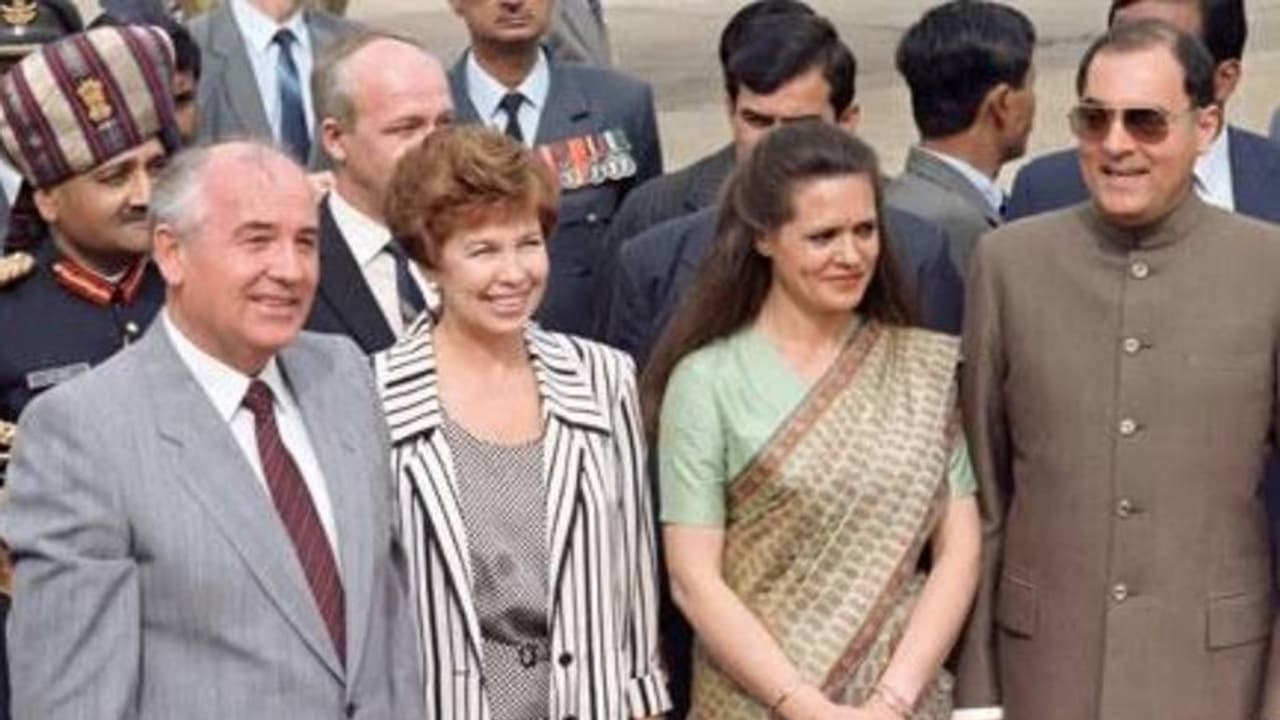Mikhail Gorbachev travelled to India with a large delegation. His defence minister and the chief of staff of the Soviet armed forces accompanied him and the first lady; they were greeted by former Prime Minister Rajiv Gandhi and his wife, now-Congress president Sonia Gandhi.
Mikhail Gorbachev, who died in Moscow on Tuesday, advocated for Soviet-India solid relations. Gorbachev visited India twice, in 1986 and in 1988. When he and his wife, Soviet first lady Raisa, visited New Delhi in 1986, they were greeted by former Prime Minister Rajiv Gandhi and his wife, now-Congress president Sonia Gandhi.

In 1988, he returned to India, where the former PM Rajiv Gandhi greeted him, and both leaders emphasized the importance of close Soviet-India ties.
In his 1986 visit to India, Gorbachev was greeted warmly. Thousands of people lined the route from the airport to the presidential palace, waving flags. As per the Los Angeles Times, Gorbachev was welcomed with "spangled elephants and red-coated soldiers mounted on camels."
"When friends call, our hearts flutter. We are delighted to have you among us," said the then-Prime Minister, Rajiv Gandhi, at a press conference. Gorbachev stated that India and Soviet Russia needed to strengthen ties to achieve long-term global peace and that Soviet Russia would always support India's genuine interests.
"We will not take any action in our foreign policy that would damage India's genuine interests," Gorbachev said.
Gorbachev made an extensive delegation trip to India. He and the first lady were accompanied by his defence minister and the chief of staff of the Soviet armed forces. The delegation included Marshal Sergei Akhromeyev, chief of staff of the armed forces, former foreign minister Eduard Shevardnadze, Anatoliy Dobrynin, head of the international affairs department of the Soviet Communist Party, and then-deputy prime minister Vladimir Kamentsev.
Following media reports, Gorbachev was accompanied by seven planeloads of food, security and communications equipment, and 31 cars. At least 500 security personnel accompanied Gorbachev, most of whom stayed at Delhi's Centaur hotel.
When Gorbachev visited Delhi, posters of him and Rajiv Gandhi were displayed on every street in the capital. During the meeting, Soviet Russia and India discussed potential areas of cooperation in space, infrastructure development, and defence.
Gorbachev's visit to New Delhi was his first official visit to an Asian country. He met with Rajiv Gandhi for four hours in a private meeting with only interpreters. Gorbachev and Gandhi also signed the Delhi Declaration, which 'called for the complete destruction of nuclear arsenals by the end of the century and emphasized the importance of nonviolent ways to solve the problem.'
When both the leaders, Gorbachev and Rajiv Gandhi, met, many in the US and the West saw this as the start of an aggressive new partnership that would influence global developments. Russia also committed to providing India with cutting-edge military hardware during this meeting. India received advanced MiG29s from Soviet Russia months after the leaders met.
Both leaders also discussed the negative consequences of the militarization of outer space at the time. Former Prime Minister Rajiv Gandhi criticized the West and sided with Russia on the Strategic Defense Initiative (SDI). The Space Defense Initiative (SDI) was a Reagan administration programme for a space-based antimissile defence system proposed by US President Ronald Reagan. Both Gandhi and Gorbachev advocated for long-term peace and disarmament.
When Rajiv Gandhi visited Moscow in 1987, Gorbachev and Gandhi had a six-hour private meeting. He also dedicated a monument to the former Prime Minister's mother, Indira Gandhi, and named a Moscow square after her.
Also Read: Who was Mikhail Gorbachev, the Soviet leader who ended the Cold War?
Also Read: This day in History: First solo flight across globe, Gorbachev okayed ban on nukes
Also Read: India thanks Russia for foiling terrorist plot; seeks SCO unity against terror
